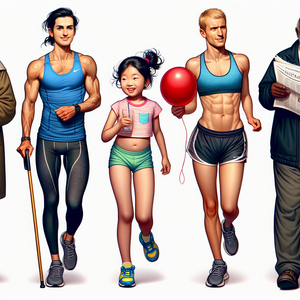The Evolution of Israeli Fashion: A Tapestry of Tradition and Modernity

Israeli fashion is a product of its multicultural society, where influences from Jewish, Arab, Druze, and other communities converge. Traditional garments, such as the Jewish Tallit and Arab Thobes, have inspired modern designers to create pieces that honor their heritage while incorporating contemporary aesthetics. For instance, intricate embroidery, a hallmark of traditional garments, is often reimagined in modern designs, giving them a fresh twist that appeals to younger generations. The diversity of the Israeli population has led to a fusion of styles, with designers drawing inspiration from various cultural backgrounds. This blending of traditions can be seen in the work of designers like Ayelet Zurer, whose collections often reflect a mix of Eastern and Western influences. By embracing this multiculturalism, Israeli fashion becomes a canvas that tells the story of its people. The result is a vibrant fashion landscape that celebrates both individual identities and a collective heritage.
Interviews with Local Designers
To gain deeper insights into the evolution of Israeli fashion, we spoke with several prominent local designers. One such designer, Yael Aflalo, founder of the sustainable fashion brand Reformation, emphasized the importance of sustainability in her work. "Fashion should not only be about aesthetics but also about responsibility," she stated. Aflalo’s commitment to environmentally friendly practices reflects a growing trend among Israeli designers who aim to create not just beautiful clothes but also a positive impact on the world. Another designer, Ronen Chen, shared how his designs are influenced by the landscapes of Israel. "I draw inspiration from the colors of the desert and the Mediterranean Sea," he explained. Chen’s collections feature earthy tones and fluid silhouettes that evoke the natural beauty of Israel, illustrating how the environment plays a crucial role in the country’s fashion narrative. In addition to Aflalo and Chen, emerging designers like Keren Wolf and Hila Shalit are making waves by incorporating innovative textiles and sustainable practices into their collections. Their work not only showcases their individual creativity but also reflects a broader shift towards ethical fashion within Israel.
Fashion Events and Collaborations
Fashion events in Israel have become platforms for showcasing local talent and fostering collaboration among designers. The Tel Aviv Fashion Week, for instance, highlights both established and emerging designers, allowing them to present their unique perspectives. This event has gained international recognition, attracting attention from fashion enthusiasts worldwide. Designers like Elie Tahari have used this platform to display their collections, blending luxury with the local spirit. Collaborative projects between designers from different backgrounds further illustrate the unifying power of fashion. Initiatives such as “Fashion for Peace” bring together Israeli and Palestinian designers to create collections that promote dialogue and understanding through shared creativity. These collaborations not only highlight the potential for fashion to bridge cultural divides but also reflect a commitment to social change within the industry. Furthermore, the rise of online fashion platforms and social media has allowed Israeli designers to reach global audiences, showcasing their work beyond local borders. The fusion of traditional craftsmanship with modern marketing techniques has helped elevate Israeli fashion on the international stage.
The evolution of Israeli fashion is a testament to the country’s rich cultural tapestry and dynamic spirit. As traditional elements mingle with contemporary trends, designers continue to push boundaries, creating innovative pieces that resonate with both local and global audiences. Through interviews with local talent and an exploration of fashion events, we see that Israeli fashion is more than just clothing; it is a reflection of identity, diversity, and the ongoing dialogue between tradition and modernity. As Israel’s fashion scene continues to evolve, it promises to remain a vibrant and influential player in the global fashion landscape. With a commitment to sustainability, social responsibility, and cultural dialogue, Israeli fashion stands as a beacon of creativity and inclusivity, reminding us that the fabric of our society is woven from the threads of our shared histories and aspirations.
Sustainable Fashion Designer
Reformation, Stella McCartney, local Israeli designers
Core Responsibilities
Create innovative clothing designs that prioritize eco-friendly materials and production methods.
Collaborate with manufacturers to ensure sustainability practices are integrated throughout the supply chain.
Stay updated on emerging sustainable fashion trends and contribute to the brand's environmental initiatives.
Required Skills
Proficiency in design software (e.g., Adobe Illustrator, CAD).
Strong understanding of sustainable materials and production processes.
Excellent communication skills to collaborate with various teams.
Fashion Marketing Specialist
Fashion marketing agencies, local Israeli fashion brands, international companies
Core Responsibilities
Develop and implement marketing strategies to promote fashion brands and collections across digital and traditional platforms.
Conduct market research to identify trends and consumer preferences, particularly focusing on multicultural fashion narratives.
Collaborate with designers and influencers to create compelling content that resonates with target audiences.
Required Skills
Experience in digital marketing, social media management, and content creation.
Strong analytical skills to assess campaign performance and adapt strategies accordingly.
Knowledge of the fashion industry and current trends, especially within Israeli fashion.
Textile Research and Development Specialist
Textile manufacturers, sustainable fashion brands, research institutions
Core Responsibilities
Research and develop innovative textiles that align with both aesthetic and sustainable fashion goals.
Collaborate with designers to create unique fabric compositions that reflect cultural influences.
Test and analyze new materials for durability, comfort, and environmental impact.
Required Skills
Background in textile engineering or fashion design with a focus on fabric development.
Familiarity with eco-friendly fabrics and sustainable sourcing practices.
Strong problem-solving abilities and attention to detail in textile performance testing.
Fashion Event Coordinator
Fashion event production companies, local fashion weeks, PR agencies
Core Responsibilities
Plan and execute fashion shows and events, ensuring a seamless experience for designers, models, and attendees.
Coordinate logistics, including venue selection, vendor management, and promotional activities.
Foster relationships with media and influencers to enhance event visibility and impact.
Required Skills
Excellent organizational and multitasking abilities, with experience in event planning.
Strong communication and interpersonal skills to work with diverse stakeholders.
Knowledge of the fashion industry and trends to create engaging event experiences.
Fashion Cultural Consultant
Fashion brands, NGOs, academic institutions
Core Responsibilities
Advise fashion brands on cultural sensitivity and appropriateness in design and marketing strategies.
Conduct research on cultural influences in fashion to inform product development and branding.
Facilitate collaborations between designers from different cultural backgrounds to promote inclusivity.
Required Skills
Strong understanding of cultural studies and fashion history, particularly in relation to Israeli and Middle Eastern cultures.
Exceptional communication and presentation skills to convey insights effectively.
Ability to navigate complex cultural dynamics within the fashion industry.


